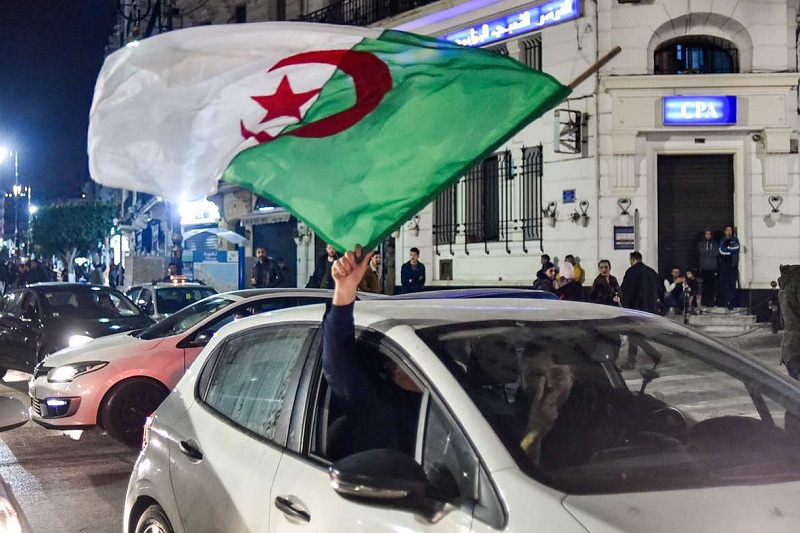
The evolution of these developments has so far been a desirable process for the protesters and they expect Algeria to experience the new Arab Spring, far from the fate of the region's fallen spring.
Abdelaziz Bouteflika, who has held four presidencies since 1999 and after the bloody clashes in Algeria, finally surrendered to the street protests and resigned from the post in the evening of April 1, 2019.
The protests began mid-March in response to his re-nomination for the presidential election. The Bouteflika's nomination, which has been out of seen since 2013 due to strokes and severe physical conditions, has led various groups of society, especially young people and modern thinking forces, to call it a scorn of the rulers of Algiers to people’ aspiration and democracy. In the eyes of many Algerians in recent years, the president's power has been in the hands of a closed circle of political, economic, and military elites and at the head the ruling ' National Liberation Front '.
Meanwhile, economic challenges such as the spread of unemployment and corruption at the top of the pyramid of the power led many Algerians to demand a change in the pyramid. Algerian leaders have tried out different ways to bring their protesters back to their homes since the start of protests, which, as far as possible, proceeded peacefully and without violence.
In the first weeks, the change of prime minister and cabinet took place, and then it was announced that Bouteflika would not be in the lead of the executive office more than one-year in the event of victory in the election, and will try to reform the constitution during this period.
Finally, on March 11, Bouteflika officially withdrew from the presidential nomination, but it was announced that the election will not be held on the due date on April 18th. The Algerian protesters, whose confidence stepped up with the step by step retreat of elite ruling and their hope for change, tried to make further changes in the political system by continuing to be present on the streets.
The protesters, doubting the intentions of the country's two last decades elite, demanded major changes after Ahmad Qaed Salah, commander of the Algerian army and a close friend of Bouteflika, about ten days ago asked for his withdrawal from power.
On the other hand, Algeria's leaders also opted for negotiation and reconciliation in a pattern unconformable with many Arab countries, forced Bouteflika withdrew from power about a month before the end of the official presidential term in April 28th. Even after submitting his formal resignation to the Constitutional Council, he apologized for his own shortcomings in a statement.
Although the Speaker currently has the authority of the President in accordance with the laws of Algeria, it is unclear how the political developments and the mechanism for doing so will proceed.
The role of institutions such as the Army in the transition of power, the formation of the founding assembly and the composition of its members, and changes to the constitution are among the issues where the dispute lies on.
On the one hand, the elite of the ruling party are trying to have a solid presence in the new structure, and on the other hand, protesters are demanding a new structural formation with new faces.
However, the bright and promising point of the developments in Algeria is that the events have so far gone peacefully, and this country has not been caught up in the civil war, contrary to the concerns that were highlighted during the first days of the protests. On the other hand, the experience of crawling Arab Spring in the early part of the decade has created alarming perspectives for forces calling for a change in the status quo.
In the North African region, Egypt, after the victory of the protesters and the resignation of Hosni Mubarak in February 2010, has undergone a brief period of democracy that eventually led to the coup in July. Now in this country and one year after Abdel Fattah el-Sisi, the commander of the army during the coup, was able to reach the presidency for the second time, the subject of a constitutional amendment is serious to provide the preparations for his presence in power until 2034.
In the territory of the eastern Neighbor of Algeria, the overthrow of the Libyan dictator's regime Muammar al-Gaddafi, and his death, which occurred in October of 2012 following a NATO offensive, only sparked chaos and turned one of the most prosperous North African countries a venue of invasion of terrorist groups.
In Morocco, though, the king of the country managed to save his government from the collapse by promising reforms and granting more freedom, but the political developments in Morocco have not been favorable to the modernizing forces since 2012.
From the viewpoint of the observers, looking at the developments of these countries, as well as Yemen, Bahrain, and ... the only successful Arab Spring experience in Tunisia was to some extent able to fulfill the people's desire to change; the country itself originated the Arab Spring, but the waves of its developments in other Arab countries brought Arabian autumn. After about a decade of these developments, there is the hope that the people of Algeria will be able to lead a floodless spring.
9455**1424
Follow us on Twitter @IrnaEnglish
 solhkhabar | Peace International News Agency Peace International News Agency , Peace News , International Agency News of Peace
solhkhabar | Peace International News Agency Peace International News Agency , Peace News , International Agency News of Peace